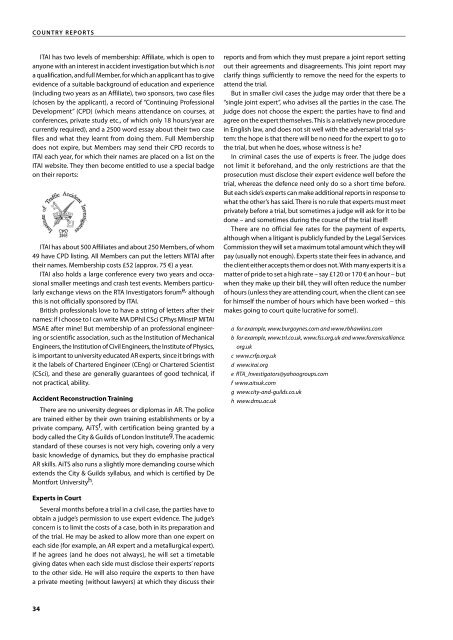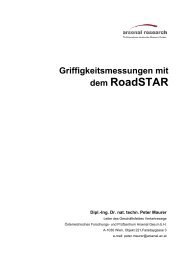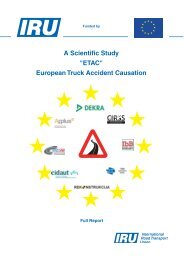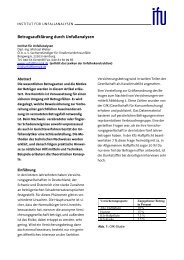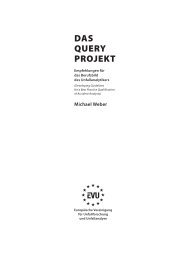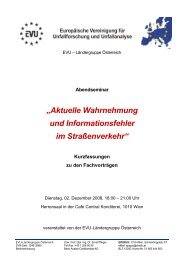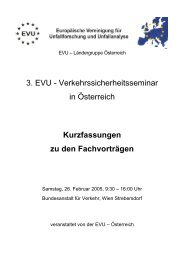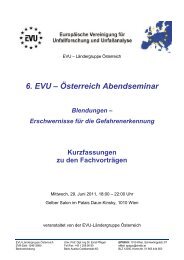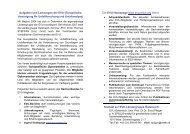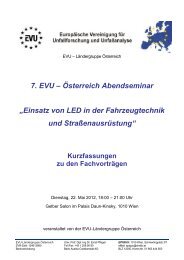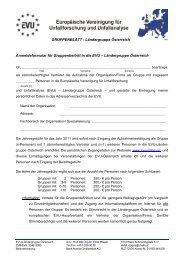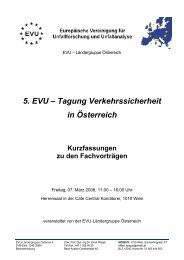THE QUERY PROJECT - European Commission - Europa
THE QUERY PROJECT - European Commission - Europa
THE QUERY PROJECT - European Commission - Europa
You also want an ePaper? Increase the reach of your titles
YUMPU automatically turns print PDFs into web optimized ePapers that Google loves.
Co u n t R y R E P o R t S<br />
ITAI has two levels of membership: Affiliate, which is open to<br />
anyone with an interest in accident investigation but which is not<br />
a qualification, and full Member, for which an applicant has to give<br />
evidence of a suitable background of education and experience<br />
(including two years as an Affiliate), two sponsors, two case files<br />
(chosen by the applicant), a record of “Continuing Professional<br />
Development” (CPD) (which means attendance on courses, at<br />
conferences, private study etc., of which only 18 hours/year are<br />
currently required), and a 2500 word essay about their two case<br />
files and what they learnt from doing them. Full Membership<br />
does not expire, but Members may send their CPD records to<br />
ITAI each year, for which their names are placed on a list on the<br />
ITAI website. They then become entitled to use a special badge<br />
on their reports:<br />
ITAI has about 500 Affiliates and about 250 Members, of whom<br />
49 have CPD listing. All Members can put the letters MITAI after<br />
their names. Membership costs £52 (approx. 75 €) a year.<br />
ITAI also holds a large conference every two years and occasional<br />
smaller meetings and crash test events. Members particularly<br />
exchange views on the RTA Investigators forum e, although<br />
this is not officially sponsored by ITAI.<br />
British professionals love to have a string of letters after their<br />
names: if I choose to I can write MA DPhil CSci CPhys MInstP MITAI<br />
MSAE after mine! But membership of an professional engineering<br />
or scientific association, such as the Institution of Mechanical<br />
Engineers, the Institution of Civil Engineers, the Institute of Physics,<br />
is important to university educated AR experts, since it brings with<br />
it the labels of Chartered Engineer (CEng) or Chartered Scientist<br />
(CSci), and these are generally guarantees of good technical, if<br />
not practical, ability.<br />
Accident Reconstruction Training<br />
There are no university degrees or diplomas in AR. The police<br />
are trained either by their own training establishments or by a<br />
private company, AiTS f , with certification being granted by a<br />
body called the City & Guilds of London Institute g . The academic<br />
standard of these courses is not very high, covering only a very<br />
basic knowledge of dynamics, but they do emphasise practical<br />
AR skills. AiTS also runs a slightly more demanding course which<br />
extends the City & Guilds syllabus, and which is certified by De<br />
Montfort University h .<br />
Experts in Court<br />
Several months before a trial in a civil case, the parties have to<br />
obtain a judge’s permission to use expert evidence. The judge’s<br />
concern is to limit the costs of a case, both in its preparation and<br />
of the trial. He may be asked to allow more than one expert on<br />
each side (for example, an AR expert and a metallurgical expert).<br />
If he agrees (and he does not always), he will set a timetable<br />
giving dates when each side must disclose their experts’ reports<br />
to the other side. He will also require the experts to then have<br />
a private meeting (without lawyers) at which they discuss their<br />
reports and from which they must prepare a joint report setting<br />
out their agreements and disagreements. This joint report may<br />
clarify things sufficiently to remove the need for the experts to<br />
attend the trial.<br />
But in smaller civil cases the judge may order that there be a<br />
“single joint expert”, who advises all the parties in the case. The<br />
judge does not choose the expert: the parties have to find and<br />
agree on the expert themselves. This is a relatively new procedure<br />
in English law, and does not sit well with the adversarial trial system:<br />
the hope is that there will be no need for the expert to go to<br />
the trial, but when he does, whose witness is he?<br />
In criminal cases the use of experts is freer. The judge does<br />
not limit it beforehand, and the only restrictions are that the<br />
prosecution must disclose their expert evidence well before the<br />
trial, whereas the defence need only do so a short time before.<br />
But each side’s experts can make additional reports in response to<br />
what the other’s has said. There is no rule that experts must meet<br />
privately before a trial, but sometimes a judge will ask for it to be<br />
done – and sometimes during the course of the trial itself!<br />
There are no official fee rates for the payment of experts,<br />
although when a litigant is publicly funded by the Legal Services<br />
<strong>Commission</strong> they will set a maximum total amount which they will<br />
pay (usually not enough). Experts state their fees in advance, and<br />
the client either accepts them or does not. With many experts it is a<br />
matter of pride to set a high rate – say £120 or 170 € an hour – but<br />
when they make up their bill, they will often reduce the number<br />
of hours (unless they are attending court, when the client can see<br />
for himself the number of hours which have been worked – this<br />
makes going to court quite lucrative for some!).<br />
a for example, www.burgoynes.com and www.rbhawkins.com<br />
b for example, www.trl.co.uk, www.fss.org.uk and www.forensicalliance.<br />
org.uk<br />
c www.crfp.org.uk<br />
d www.itai.org<br />
e RTA_Investigators@yahoogroups.com<br />
f www.aitsuk.com<br />
g www.city-and-guilds.co.uk<br />
h www.dmu.ac.uk


